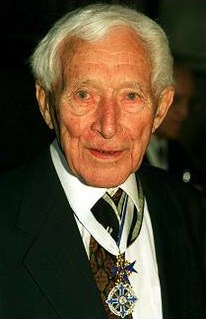A Quote by Vladimir Nabokov
A philistine is a full-grown person whose interests are of a material and commonplace nature, and whose mentality is formed of the stock ideas and conventional ideals of his or her group and time.
Related Quotes
Somebody who sticks to his guns can be called a stubborn person or a principled person, it depends on whether you like his ideas or not. You can call somebody whose ideas you don't like an ideologist or a person of ideas. You can call somebody whose actions you don't like a pragmatist if you like them, or an opportunist if you don't.
I think Nature, if she interests herself much about her children, must often feel that, like the miserable Frankenstein, with her experimenting among the elements of humanity, she has brought beings into existence who have no business here; who can do none of her work, and endure none of her favours; whose life is only suffering; and whose action is one long protest against the ill foresight which flung them into consciousness.
A Christian is not a person who believes in his head the teachings of the Bible. Satan believes in his head the teachings of the Bible! A Christian is a person who has died with Christ, whose stiff neck has been broken, whose brazen forehead has been shattered, whose stony heart has been crushed, whose pride has been slain, and whose life is now mastered by Jesus Christ.
The anarch is oriented to facts, not ideas. He fights alone, as a free man, and would never dream of sacrificing himself to having one inadequacy supplant another and a new regime triumph over the old one. In this sense, he is closer to the philistine; the baker whose chief concern is to bake good bread; the peasant, who works his plow while armies march across his fields.
I respect not his labors, his farm where everything has its price, who would carry the landscape, who would carry his God, to market, if he could get anything for him; who goes to market for his god as it is; on whose farm nothing grows free, whose fields bear no crops, whose meadows no flowers, whose trees no fruits, but dollars.
September has come, it is hers Whose vitality leaps in the autumn, Whose nature prefers Trees without leaves and a fire in the fireplace. So I give her this month and the next Though the whole of my year should be hers who has rendered already So many of its days intolerable or perplexed But so many more so happy. Who has left a scent on my life, and left my walls Dancing over and over with her shadow Whose hair is twined in all my waterfalls And all of London littered with remembered kisses.
A poet is an unhappy creature whose heart is tortured by deepest suffering but whose lips are so formed that when his sighs and cries stream out over them, their sound beomes like the sound of beautiful music . . . . And men flock about the poet saying, Sing for us soon again; that is to say, may new sufferings torture your soul, and may your lips continue to be formed as before.
If an enthusiastic, ardent, and ambitious man marry a wife on whose name there is a stain, which, though it originate in no fault of hers, may be visited by cold and sordid people upon her, and upon his children also: and, in exact proportion to his success in the world, be cast in his teeth, and made the subject of sneers against him: he may, no matter how generous and good his nature, one day repent of the connection he formed in early life; and she may have the pain and torture of knowing that he does so.






































